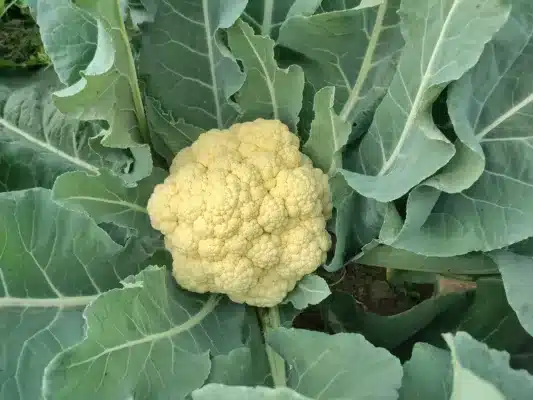Unlocking the Nutritional Power: Health Benefits of Cauliflower Leaves
In Hindi it is known as Phoolgobee and in Tamil it is known as Pookosu, though familiar with the tribals and old village people. Very much known is Cauliflower
Here, In my city normally people purchase only the cauliflower and make the leaves cut of from the cauliflower, and vendor sell those leaves for cattle feed. According to few people I talked they did not know that leaves can be consumed.
Table of Contents

Origin
The cultivation of cauliflower, Brassica oleracea var. botrytis, likely originated in the Mediterranean region, with historical records suggesting its presence in ancient civilizations such as Greece and Rome. The wild ancestor of cauliflower, Brassica oleracea, is native to the coastal areas of Europe.
Along with other cruciferous vegetables like broccoli, cabbage, and kale, has been selectively bred over centuries to develop the large, compact heads we recognize today. Initially, cauliflower had a variety of colors, including purple, green, and orange, but through cultivation, the white cauliflower became the most commonly consumed variety.
Over time, it spread to different parts of the world, becoming a staple in various cuisines and diets. Its adaptability to different climates and growing conditions contributed to its widespread cultivation and popularity globally.
Today, cauliflower is cultivated in many regions around the world, with major producers including countries like China, India, the United States, and several European nations. Its versatility in cooking and its nutritional benefits have ensured its continued popularity and consumption across diverse cultures and culinary traditions.
Its leaves boast an impressive array of nutrients, making them a valuable addition to your diet:
Fiber: Its leaves are abundant in fiber, aiding in digestion and promoting gut health.
Vitamin C: Rich in vitamin C, its leaves collaborate with selenium to fortify the immune system, shielding the body against illnesses.
Calcium: A notable source of calcium, cauliflower leaves contribute to the prevention of osteoporosis and other bone ailments, ensuring bone strength and density.
Iron: Its leaves contain iron, which is vital for red blood cell production and overall energy levels.
Vitamin K: With vitamin K, cauliflower leaves facilitate calcium absorption in bones, maintaining bone health and density.
Beta-carotene: Abundant in beta-carotene, leaves help stave off vitamin A deficiency and promote eye health, safeguarding vision.
Folic acid: Cauliflower leaves contain folic acid, crucial for supporting cell growth and development, especially during pregnancy.
Antioxidants: Natural antioxidants found in leaves play a pivotal role in cancer prevention, combating harmful free radicals and promoting overall well-being.
Furthermore, cauliflower leaves serve as an excellent source of potassium, folate, selenium, and essential fatty acids, enriching your diet with a myriad of essential nutrients. Incorporating their leaves into your meals can significantly contribute to your overall health and vitality.

Here are the health benefits associated with cauliflower leaves
Fiber: Their leaves are rich in fiber, which promotes digestive health by aiding in regular bowel movements and preventing constipation.
Vitamin C: Being a good source of vitamin C, it support immune function, help in wound healing, and act as antioxidants, protecting cells from damage caused by free radicals.
Calcium: Cauliflower leaves contain calcium, a mineral essential for bone health. Adequate calcium intake helps prevent osteoporosis and maintains bone density, reducing the risk of fractures and bone-related diseases.
Iron: Iron found in its leaves is crucial for the production of red blood cells, which carry oxygen throughout the body. Adequate iron intake prevents anemia and supports overall energy levels.
Vitamin K: Leaves provide vitamin K, which plays a vital role in blood clotting and bone metabolism. Vitamin K ensures proper calcium utilization, contributing to bone strength and density.
Beta-carotene: Rich in beta-carotene, cauliflower leaves support eye health and vision. Beta-carotene is converted into vitamin A in the body, promoting healthy eyesight and reducing the risk of age-related macular degeneration.
Folic acid: It contain folic acid, which is important for cell division and growth. Adequate folic acid intake is particularly crucial during pregnancy to prevent birth defects and support fetal development.
Antioxidants: Natural antioxidants present in it which helps protect cells from damage caused by oxidative stress, reducing the risk of chronic diseases such as cancer, heart disease, and diabetes.
In addition to these nutrients, cauliflower leaves also provide potassium, folate, selenium, and essential fatty acids, contributing to overall health and well-being. Incorporating cauliflower leaves into your diet can be a nutritious way to support various aspects of your health.
